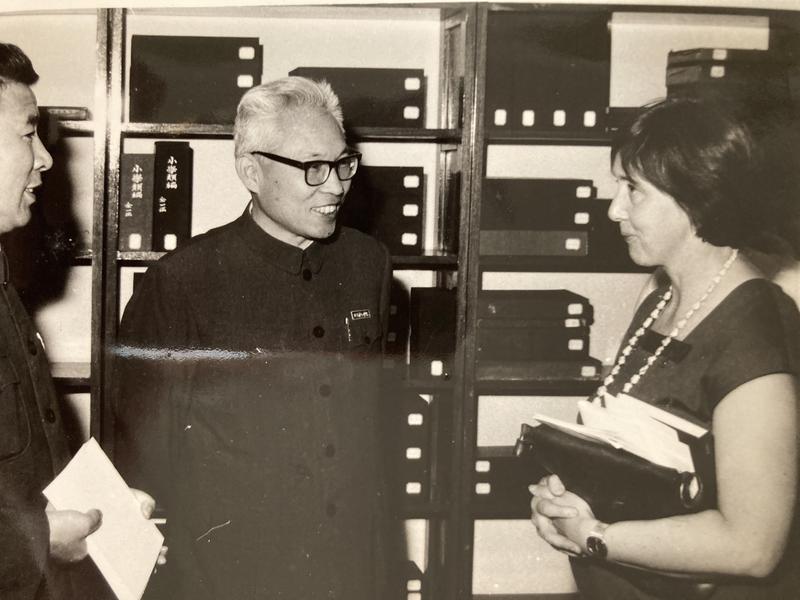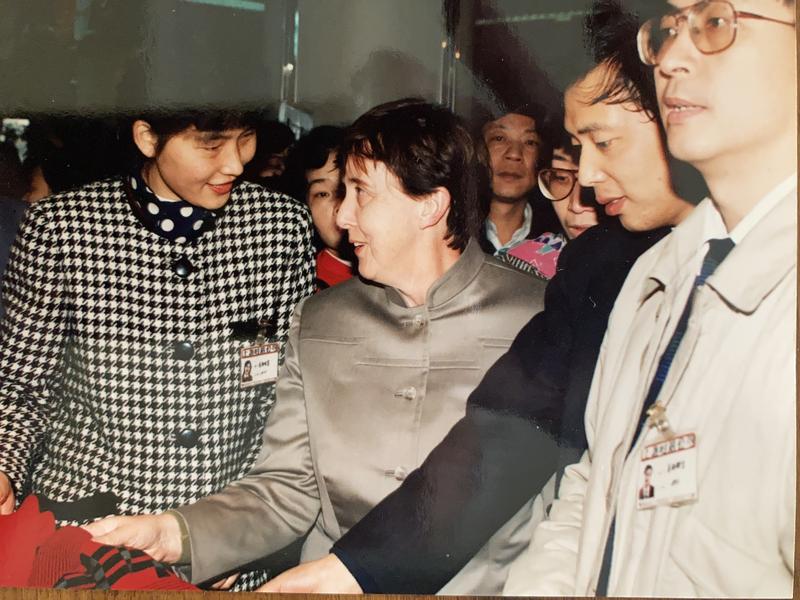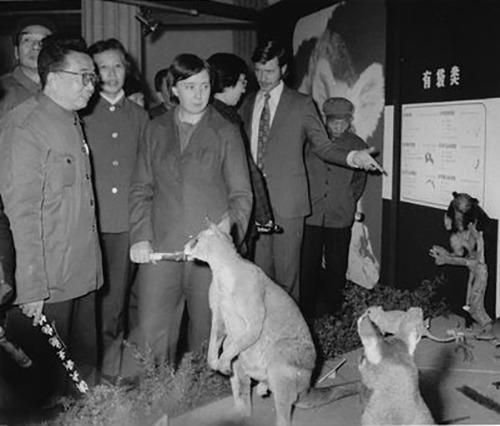Knowledge of language and Beijing posting provides a unique perspective, Karl Wilson reports in Sydney.
 Jocelyn Chey making a presentation of books to the National Library when she was Australian cultural counselor in Beijing in 1975. (PHOTO PROVIDED TO CHINA DAILY)
Jocelyn Chey making a presentation of books to the National Library when she was Australian cultural counselor in Beijing in 1975. (PHOTO PROVIDED TO CHINA DAILY)
Australian diplomat and academic Professor Jocelyn Chey has spent most of her adult life involved with China. From a diplomatic posting to Beijing and as Australia's consul general to Hong Kong before the handover, she has witnessed the vast transformation that has taken place in China over the last six decades, from the closing years of the late Chairman Mao Zedong through to the enormous changes that have shaped today's modern China.
A fluent Mandarin speaker and Chinese classics scholar, after graduating with a master's degree, Chey soon found herself emerged in contemporary politics, working for the British government in Hong Kong doing what she describes as "reading the tea leaves".
"The world wanted to know what was happening in China and Hong Kong was the place to be," she says.
In my opinion, the CPC has endured because it has adapted its policies and practices to meet new challenges as they have arisen
Jocelyn Chey, professor and former diplomat
She met and married her Chinese husband in Hong Kong shortly before the "cultural revolution" (1966-76), which gave her a much better perspective on not just what was happening in China, but also Chinese society.
In the early 1970s, she found herself working with the then department of trade at a time when Australian foreign policy was destined for a major overhaul following the election of Labor leader Gough Whitlam in 1972.
One of the first things Whitlam did was to recognize the People's Republic of China.
Chey says that, even if the Liberals had won the election back then, it would have had to change its stance on China.
"The world was changing and so was China," she says.
In an interview with China Daily to mark the 100th anniversary of the founding of the Communist Party of China, Chey, 82, reflected on the role the CPC has played in shaping today's modern China starting with the country's unique system of multi-party cooperation and political consultation and on why it works.
"There are several possible answers to that question," she says.
"Countries may be ranked according to national wealth, education levels, safety and other factors. Probably the most crucial factor is governance, and that in turn includes efficiency, fairness and justice."
 Chey visits the Shanghai Fashion Corp in 1990. (PHOTO PROVIDED TO CHINA DAILY)
Chey visits the Shanghai Fashion Corp in 1990. (PHOTO PROVIDED TO CHINA DAILY)
With a history of 100 years, the CPC has a membership of more than 95 million and has been in office for 72 years. This makes the CPC rare in the history of the world's political parties.
"The British Conservative Party was founded in 1834, the US Democratic Party in 1828 and the German Social Democratic Party in 1863. So, as you observe, it is not unknown for a political party to endure for more than 100 years. Your question is probably 'why?'
"In my opinion, the CPC has endured because it has adapted its policies and practices to meet new challenges as they have arisen. In other words, it has had a pragmatic approach to resolving problems.
"In 1949, when the CPC defeated the Kuomintang, China was in economic ruin. Per capita gross national income was only US$27, which was less than half of the figure in India, according to United Nations' Economic and Social Commission for Asia and the Pacific.
"Now China is the second-largest economy in the world, following the United States."
So, what part has the CPC played in China's economic growth?
She says that since the CPC has been in office in China since 1949, it can "accept credit and blame for all the ups and downs of the economy since then".
"Successes are really too many to number but include lifting of millions out of poverty and opening the economy to international trade and investment."
In 1995, American scholar Lester Brown wrote that China would not be able to feed herself and would turn to the world market, making China's food scarcity ultimately the world's scarcity.
"His article and book made a stir in the world for a while. But it turned out that the professor's prediction was wrong. China has not only fed herself but also contributed to the world's food security."
What policies have made it possible?
"China's food security has been strengthened through the establishment of national stockpiles of grain and other staple foods and through encouraging the modernization of agriculture.
"The recent slowing of population growth and changes in diet consequent on rising living standards have also improved China's ability to provide for the whole population.
Ideological and institutional divergences, now and then, bring unpleasant episodes in the relationships between China and some Western countries. But China's ties with developing countries have always been close. Why is this the case?
"The terms 'First World, Second World and Third World' were coined by the United Nations during the Cold War period, and China was most active in the nonaligned group known as the Third World. Good relationships were built up then that have lasted up to the present.
"China itself is emerging from a 'developing country' status and is now a major international aid donor. This endears it to aid recipients but 'First World' nations from time to time fail to adjust their way of relating to China."
 Chey with the curator of the Exhibition of Australian Fauna Specimens that toured Beijing, Shanghai and Hangzhou in 1976. (PHOTO PROVIDED TO CHINA DAILY)
Chey with the curator of the Exhibition of Australian Fauna Specimens that toured Beijing, Shanghai and Hangzhou in 1976. (PHOTO PROVIDED TO CHINA DAILY)
The anti-corruption campaigns since the 18th National Congress of the CPC on Nov 8, 2012 have been one of the most powerful approaches the Party under the leadership of President Xi Jinping has taken. And they have been effective and successful.
"Anti-corruption campaigns are always popular with the people. For example, President Vladimir Putin in Russia has built his popularity with the Russian people on the effective way he deals with corruption. If there is corruption and crime, people do not feel safe and cannot plan with certainty.
"China's present war on corruption is welcomed by the people, and internationally. I hope that there will be continued deep cooperation between the law enforcement agencies of China and the world, including Australia."
Xi himself "has come up with the Belt and Road Initiative and the proposal for building a community with a shared future for humanity," she notes.
"China's peacekeeping contributions have been excellent. International economic decision-making institutions should pay more respect to China and other developing countries when formulating policies.
China has more tools of soft power, like Confucius institutes, educational outreach and films, since the country adopted a policy of reform and opening-up. Its soft power builds bridges between China and the rest of the world, helping foreigners have a better understanding of the country.
"Soft power can be defined as the power of attraction," she says, "and it works best when it operates naturally as exchanges between individuals and communities … The best ambassadors for China are its own students, scientists and artists. They are contributing immensely to the world, including in Australia.
"Language is an important tool for cultural exchange, although it is not the decisive tool. It is unfortunate that the Chinese language, which is a precious part of the world's cultural heritage, is difficult for foreigners to learn."
Many studies of public opinion have shown that the 100-year-old CPC continues to maintain a high level of popular support in China.
"The CPC has achieved much in the past 100 years. As I mentioned above, it succeeded when it was able to respond to changing circumstances and to adapt its policies. Like any political party, it was able to keep in touch with common people and to reflect their opinions to the leadership. In my view, these communication channels are most important."
Contact the writer at karlwilson@chinadailyapac.com


